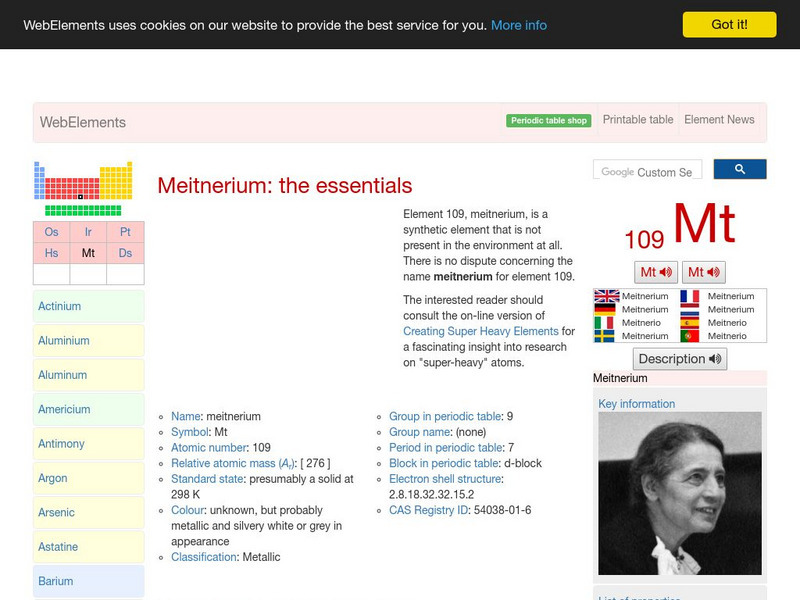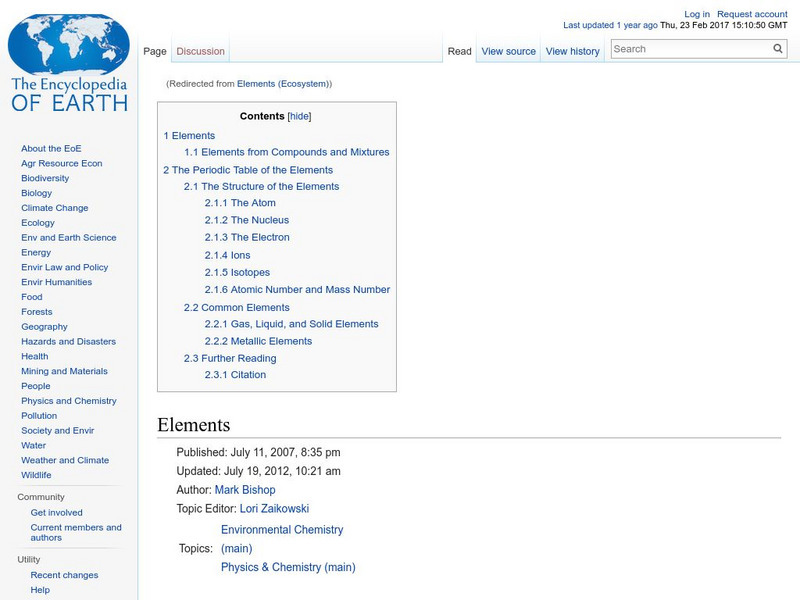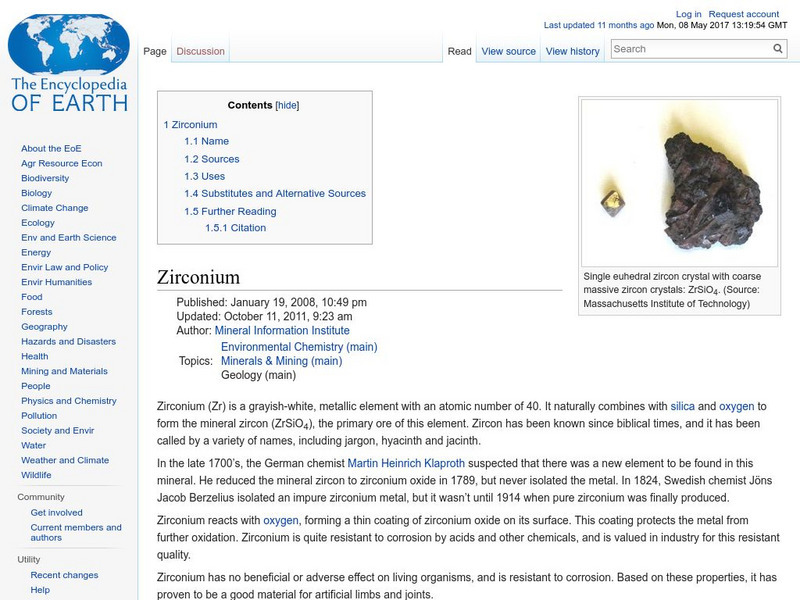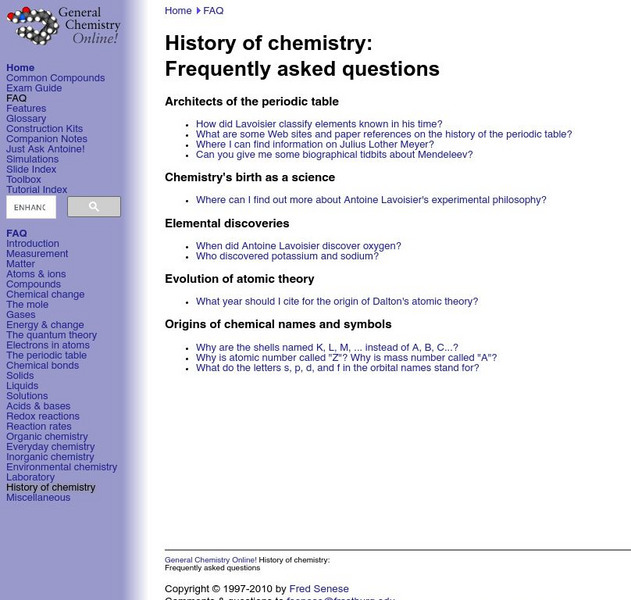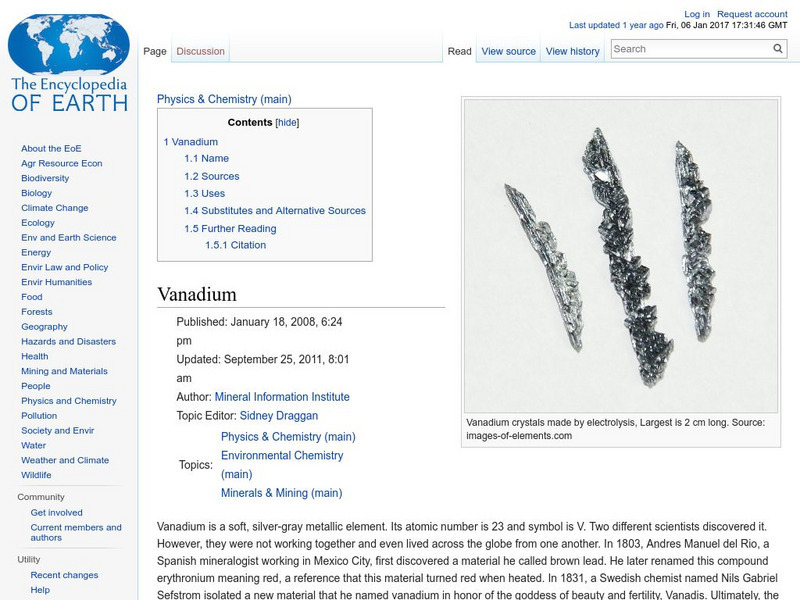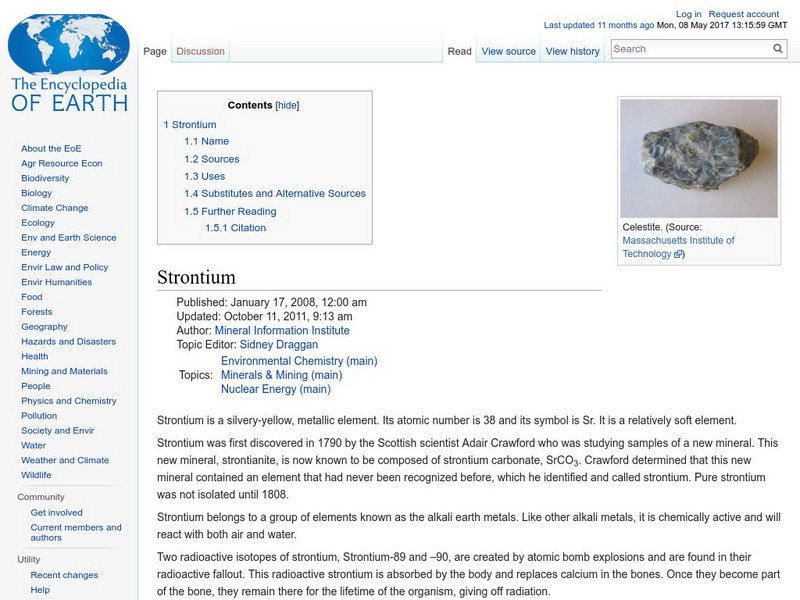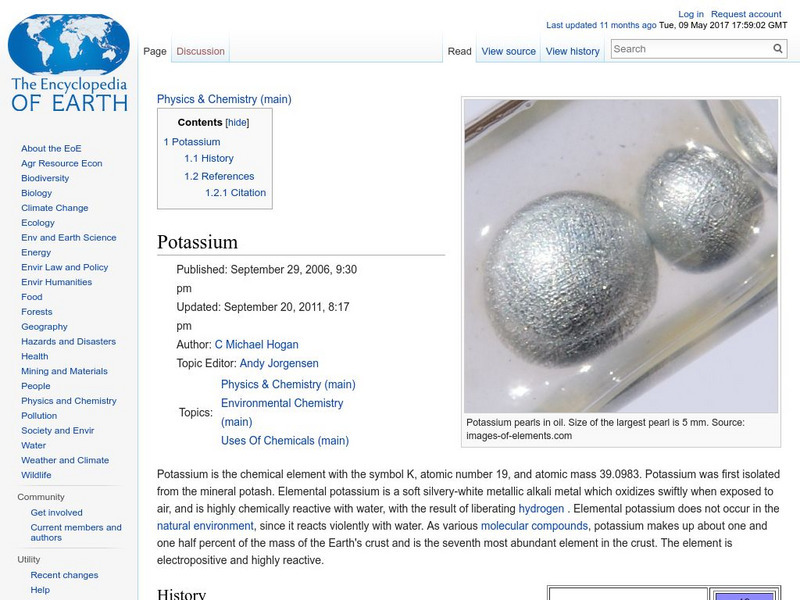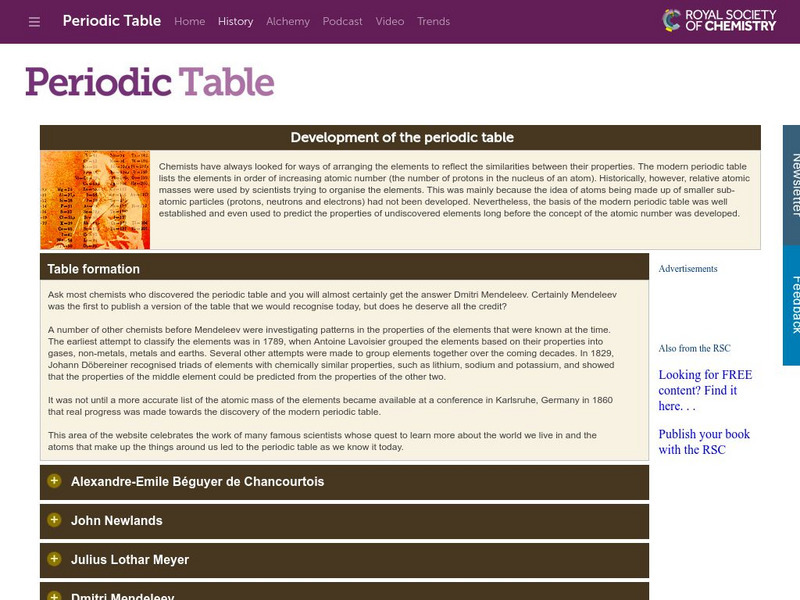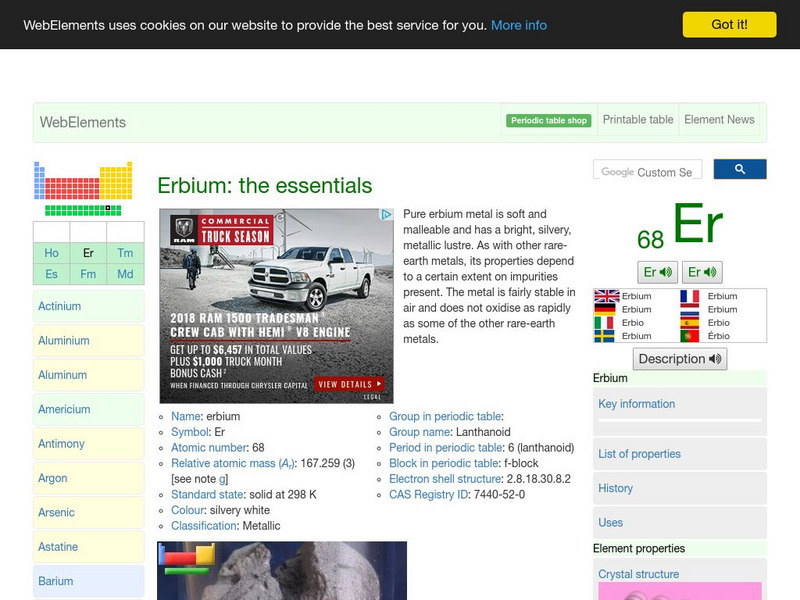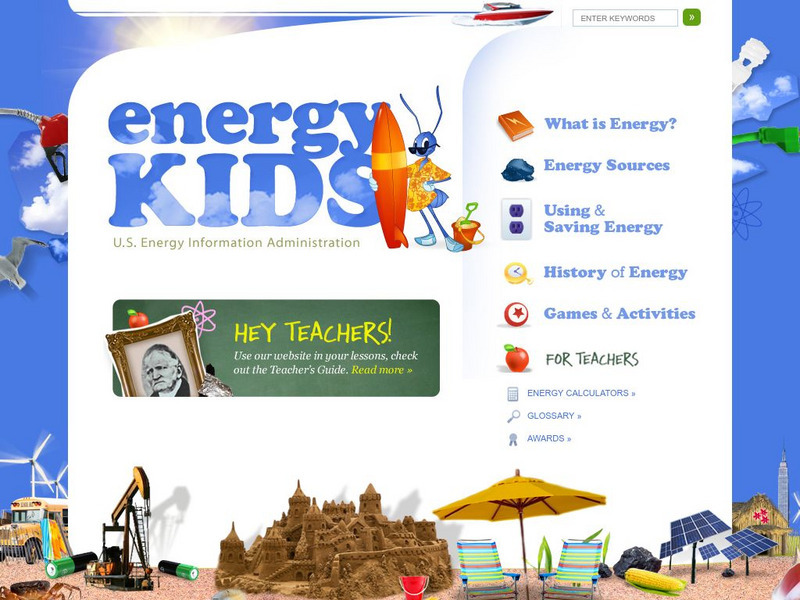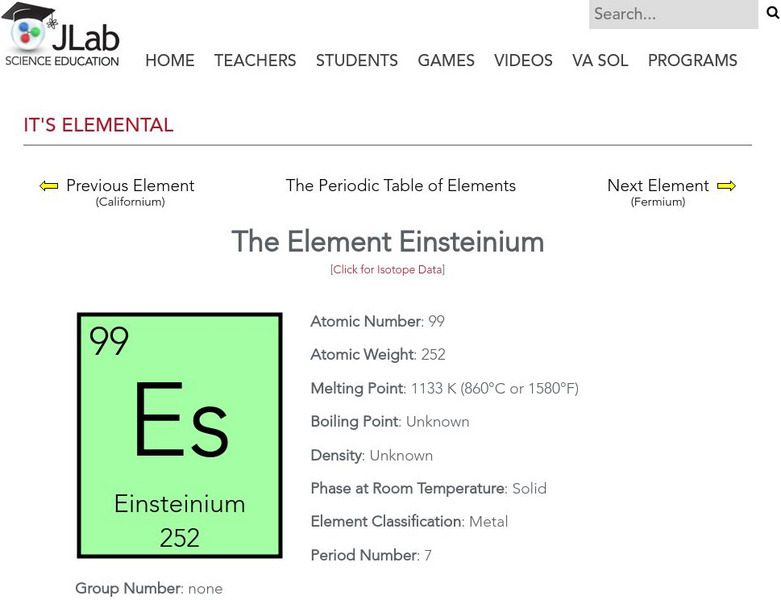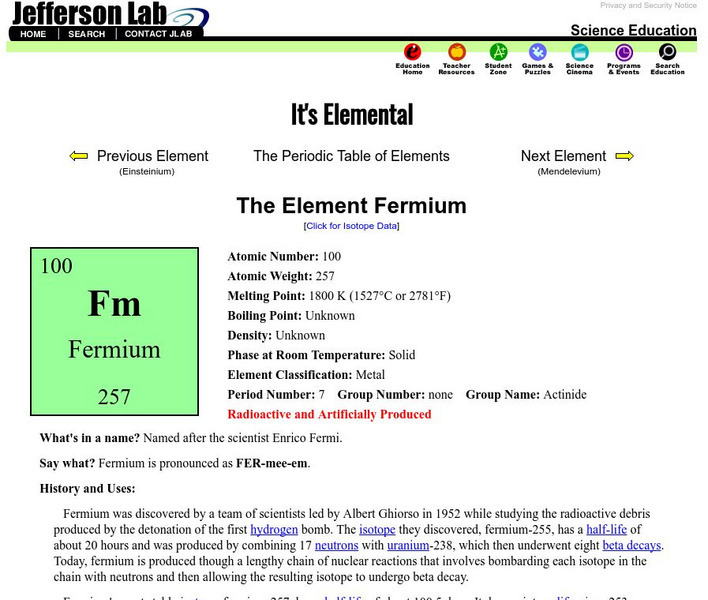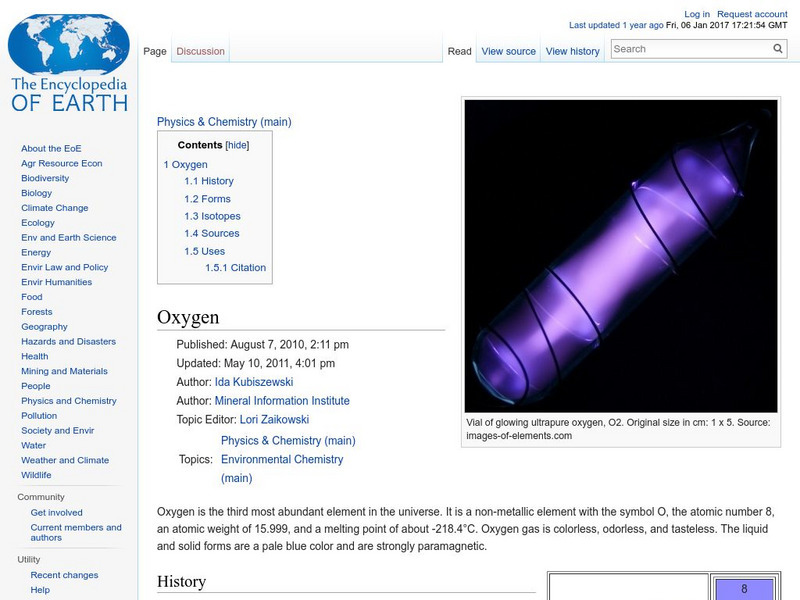Hi, what do you want to do?
Thomas Jefferson National Accelerator Facility
Jefferson Lab: The Periodic Table of Elements
Click an element on the Periodic Table of Elements to learn more information such as the history and uses, origin of the name, isotope data, and more essential facts!
American Museum of Natural History
American Museum of Natural History: O Logy: How to Read the Periodic Table
An illustrated how-to for understanding how to read and extract information from the periodic table.
Texas Education Agency
Texas Gateway: Atoms, Elements and the Periodic Table: The Atomic Model [Pdf]
A slideshow looking at the contributions of scientists over time to our understanding of atomic theory. Looks at models of the atom developed by Democritus, John Dalton, J.J. Thomson, Ernest Rutherford, Niels Bohr, and James Chadwick, as...
TED Talks
Ted: Ted Ed: Silver: Periodic Table of Videos
The team at Periodicvideos has created a TED-Ed Lesson for every element of the periodic table. This video is on silver, a famous metal used since ancient times to make currency and jewelry. [9:23]
Web Elements
Web Elements Periodic Table: Meitnerium
This WebElements site offers basic data, history and the story of the synthesis of meitnerium.
Encyclopedia of Earth
Encyclopedia of Earth: Elements
Engaging and very informative article that explains what elements are, some of their history, how they are represented, the categories of elements, the periodic table, and how they are structured and classified.
Encyclopedia of Earth
Encyclopedia of Earth: Hydrogen
Information about the first element on the periodic table, Hydrogen, atomic number 1. Covers its history, sources, physical and atomic properties, places it occurs naturally on the Earth and in space, its many uses, and forms in which it...
Encyclopedia of Earth
Encyclopedia of Earth: Zirconium
Information about the element Zirconium, atomic number 40. Covers history of its discovery, sources, physical properties, atomic properties, how abundant it is on the Earth, details about permissible exposure, uses, and possible...
Frostburg State University
General Chemistry Online: History of Chemistry
A compilation of frequently asked questions in the world of chemistry. Look for answers about atomic theory, periodic table, and Lavoisier in this FAQ.
Encyclopedia of Earth
Encyclopedia of Earth: Vanadium
Information about the element, Vanadium, atomic number 23. Covers its history, sources, physical and atomic properties, prevalence on the Earth, details about any health-related regulations, uses, and possible substitutes.
Encyclopedia of Earth
Encyclopedia of Earth: Strontium
Information about the element, Strontium, atomic number 38. Covers its history, sources, physical properties, atomic properties, how abundant it is on the Earth, details about permissible exposure, uses, and possible substitutes.
Encyclopedia of Earth
Encyclopedia of Earth: Potassium
Basic information about the element Potassium, atomic number 19. Covers its history, physical and atomic properties, and how abundant it is on the Earth.
Encyclopedia of Earth
Encyclopedia of Earth: Copper
Information about the element, Copper, atomic number 29. Covers its history, sources, physical properties, atomic properties, how abundant it is on the Earth, details about permissible exposure, uses, and possible substitutes.
Royal Society of Chemistry
Visual Elements/history
A history and description of the modern periodic table, including its early origins, many contributors and later additions.
Royal Society of Chemistry
Royal Society of Chemistry: Nitrogen
A short but nice description of nitrogen's uses and properties. Discusses the history of nitrogen and its characteristics.
Georgia Department of Education
Ga Virtual Learning: Ap Chemistry: Atomic Theory
In this module students explore how matter is classified, the history of atomic theory, subatomic particles, modern atomic theory, electron configuration, the periodic table and its trends, and spectroscopy.
Web Elements
Web Elements Periodic Table: Erbium
Webelements offers a nice presentation on erbium, its properties, uses and history, along with basic data. Clearly presented.
US Energy Information Administration
U.s. Eia Energy Kids
This comprehensive lesson teaches all about energy, including the different forms, the periodic table, history of human energy use and production, and energy units. It contains an interactive energy calculator, games and activities, and...
Other
Chemical Education Digital Library: Periodic Table Live!
By clicking on individuals elements, users can explore a broad range of information about the element, their reactions, their properties, their structures, and their histories.
Thomas Jefferson National Accelerator Facility
Jefferson Lab: It's Elemental the Element Einsteinium
An overview of the element Einsteinium. Lists basic periodic table information along with its history and uses.
Thomas Jefferson National Accelerator Facility
Jefferson Lab: The Element Fermium
A description of the chemical element Fermium. Gives scientific information such as atomic weight and atomic number, and also discusses its history and uses.
Encyclopedia of Earth
Encyclopedia of Earth: Oxygen
Information about the element, Oxygen, atomic number 8. Covers history, physical and atomic properties, abundance, and permissible exposure limits. Also discusses forms of oxygen, isotopes, sources, and uses.
Encyclopedia of Earth
Encyclopedia of Earth: Uranium
Information about the radioactive element, Uranium, atomic number 92. Describes its history, physical and atomic properties, how abundant it is on the Earth, and permissible exposure limits. Also discusses sources, uses, isotopes,...
Tom Richey
Slide Share: Atomic Structure
Slideshow looking at the history of models of the atom, including those proposed by John Dalton, J.J. Thomson, Ernest Rutherford, Niels Bohr, and James Chadwick. Discusses subatomic particles, including the numbers of protons, neutrons,...






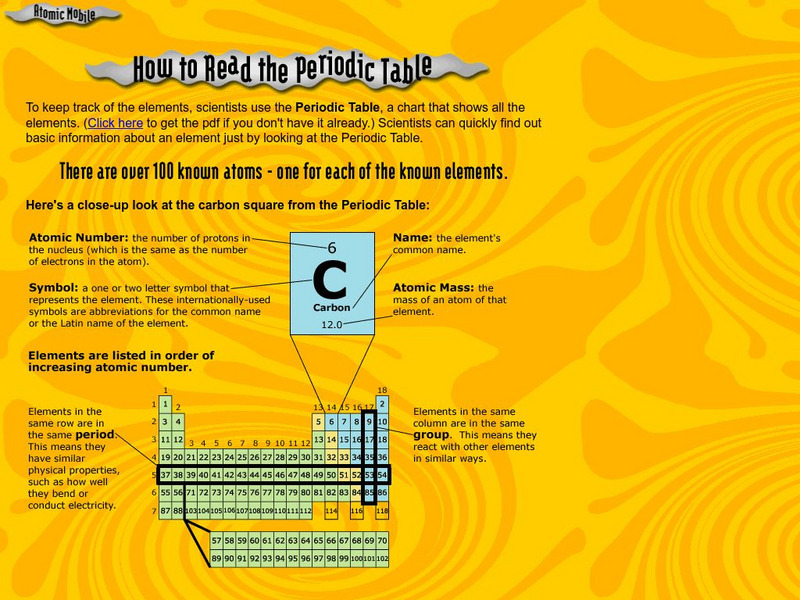
![Texas Gateway: Atoms, Elements and the Periodic Table: The Atomic Model [Pdf] PPT Texas Gateway: Atoms, Elements and the Periodic Table: The Atomic Model [Pdf] PPT](https://static.lp.lexp.cloud/images/attachment_defaults/resource/large/FPO-knovation.png)

